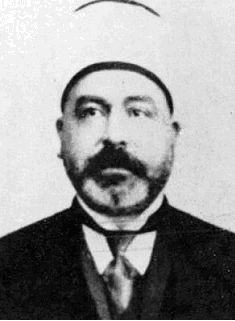The Muslim “reformers” and Darwin
Al Afghani's writings show towards science some elements of convergence as well as strong dissent. He has authored but a few books outside his contributions to the review The Firmest Bond (al-Urwah al-Wuthqa), itself for the most part drafted by his disciple Muhammad ‘Abduh. However included among these rare publications remains a thorough-going refutation of the materialists drafted in Persian and published in India in 1881, wherein he condemned theses lumped together under the “materialist” label. After a vast historical survey of theories from classical Greece to the middle of the 19th century, he pored at length over Darwinism, systematically deriding the British scientist's thesis: “« In Darwin's opinion, it is possible for the flee to become an elephant over time, after many centuries, and likewise for the elephant to turn into a flee. »
” He proposes another example, this time concerning men: “« Is this wretch deaf to the history of the Hebrew and Arab peoples? They have practiced circumcision for thousands of years, leaving no male child uncircumcised; yet to this day no child has been born circumcised, lest he were impotent. »
” Thus concluding: “« I fancy I see this unfortunate man [Darwin] founder in a desert of hypotheses, in the fallow lands of tall tales, solely for the imperfect resemblance between monkeys and men. »
” Yet Darwin is not alone in his mistaken ways according to the Muslim reformer. He tars with the same brush other thinkers throughout the ages and the world, to wit Persian Mazdak, 11th century Egypt's Ismailian and Qarmatian thinkers, the philosophers Rousseau and Voltaire right up to the Communists, Nihilists and other Socialists.
Three years later Afghani resumed his enquiry in an article entitled “Materialists in India” published in The Firmest Bond. This time, he had Muslim philosopher Syed Ahmed Khan[1]'s work in his sights. The latter owned that “« the work of God (nature and its laws) was in conformity with the Word of God (the Quran) »
”, asserting that all laws, including religious laws were to be found in nature. Al Afghani rejected every aspect of Syed Ahmad Khan's theory, which he called “naturalist” (working the English word “nature” into Arabic as “nichari”). He accused him of currying favour with the British by professing Christianity then materialism thereby aiding them in their fight against Islam and the Muslims [doc 12]. The political dimension of the text is plain and “Orientals” adopting so-called materialist theses are dealt with more severely yet than the instigators of the debate such as Charles Darwin. This piece of apologetics in favour of his conception of the Muslim faith, along with his numerous arguments drawn from the biological observation of nature to feed his Refutation, as well as his answer to Renan, suggest that Afghani did not position himself against science as such but that he intended to keep it within a framework fixed by religion, namely prior recognition of a unique God revealed through the message he has addressed to his prophets. Islam and science are far from incompatible, according to him since, originally, “pure” Islam reportedly encouraged science. From this angle, the problem does not lie with science but with those who stand for “negating divinity”, namely the materialists who are wrong in their belief that “« there is no afterlife for men »
”. As such, the rejection of scientific methods and outcomes seems to be Al-Afghani's way to express his rejection of the civilising mission the Europeans claimed for themselves and which he saw as a threat to the integrity of the “Islamic nation” (Umma).
The Islamic Nahda should accordingly unfold in opposition to European imperialism, by means of a call on all “Orientals” to rebuild from within the Arab-Muslim science of old. This outlook took an even more distinctive edge with Rashid Rida, likewise interested in Darwinism and acquainted with it through his perusal of the Cairo-based Lebanese review Al Muqtataf. In an article published in March 1930 he went to some lengths to stress that Darwin never negated the existence of God: “« He was asked before his death whether he believed in a creator God and he answered: »
‘« I have no doubt whatsoever that there is a God in nature »
'.” Without directly referring to it, Rida subtly realigned his master Al-Afghani who had placed Darwin in the category of “deniers of the divinity”. According to Rida it is fitting to distinguish between “heretics” who refute the sacred texts and who amount to a minority among thinkers and those who “neither reject nor support them” and among whom he placed Darwin on the basis of the above quote. This led him to the same conclusion: “science should not be met with mistrust, unlike that minority whose object was to “« destroy Islam, to convert [Muslims] to Christianity, indeed to heresy »
”. This minority operated, Rashid Rida opined, in Christian missionary schools and throughout Egypt's state schools, representing thereby an imminent and frontal threat.
Thus, for Muslim reformists such as Al-Afghani, Muhammad ‘Abduh and Rashid Rida, Islam is not incompatible with science, as long as scientists do not seek to undermine Islam. The real enemy is not science but those they accuse of manipulations aimed at the annihilation of “Islam's values”.








